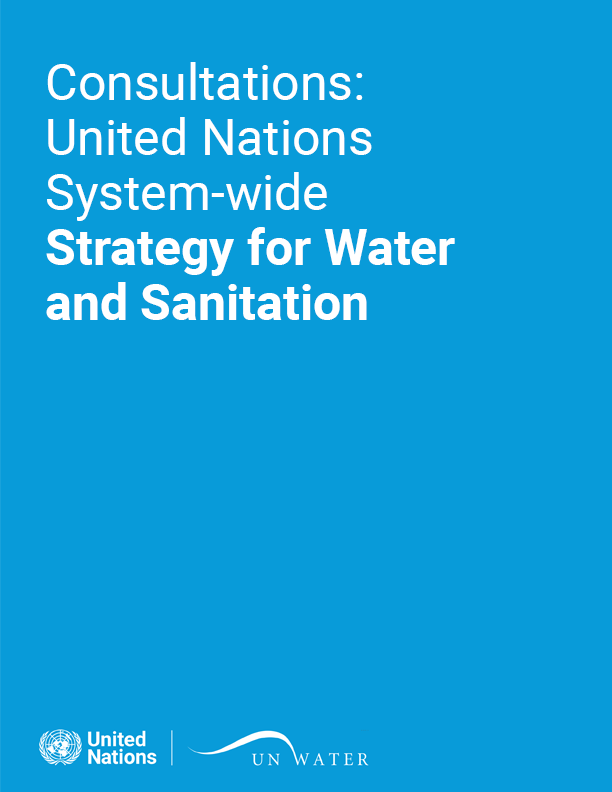Consultations: United Nations System-wide Strategy for Water and Sanitation


In response to key milestones in 2023, including the historic UN 2023 Water Conference, Member States adopted UN General Assembly resolution A/RES/77/334, requests the Secretary-General to present a United Nations system-wide water and sanitation strategy in consultation with Member States before the end of the seventy-eighth session of the General Assembly.
Consultations (as of 12 February)
Member States
Australia, Canada, European Union and European Union Member States, Guatemala, Japan, Netherlands (Kingdom of the), Republic of Korea, Russian Federation, Saudi Arabia, Singapore, Türkiye, United Kingdom, United States of America.
United Nations System
UN-Water Members:
Food and Agriculture Organization of the United Nations (FAO), International Fund for Agricultural Development (IFAD), International Labour Organization (ILO), International Telecommunication Union (ITU), International Atomic Energy Agency (IAEA), International Organization for Migration (IOM), Office of the United Nations High Commissioner for Human Rights (OHCHR), Secretariat of the Convention on Biological Diversity (CBD), Secretariat of the United Nations Convention to Combat Desertification (UNCCD), Secretariat of the United Nations Framework Convention on Climate Change (UNFCCC), United Nations Department of Economic and Social Affairs (UN DESA), United Nations Office for Disaster Risk Reduction (UNDRR), United Nations Office for Outer Space Affairs (OOSA), United Nations Capital Development Fund (UNCDF), United Nations Children’s Fund (UNICEF), United Nations Conference on Trade and Development (UNCTAD), United Nations Development Programme (UNDP), United Nations Entity for Gender Equality and the Empowerment of Women (UN Women), United Nations Environment Programme (UNEP), United Nations High Commissioner for Refugees (UNHCR), United Nations Human Settlements Programme (UN-Habitat), World Food Programme (WFP), United Nations Economic Commission for Africa (UNECA), United Nations Economic Commission for Europe (UNECE), United Nations Economic Commission for Latin America and the Caribbean (UNECLAC), United Nations Economic and Social Commission for Asia and the Pacific (UNESCAP), United Nations Economic and Social Commission for Western Asia (UNESCWA), United Nations University (UNU), United Nations Educational Scientific and Cultural Organization (UNESCO), United Nations Industrial Development Organization (UNIDO), United Nations Institute for Training and Research (UNITAR), United Nations Tourism, World Bank Group (WB), World Health Organization (WHO), World Meteorological Organization (WMO).
Other UN entities contributing to the strategy development process (non-UN-Water Members):
Sustainable Development Unit, Executive Office of the Secretary General (EOSG), Secretariat, High-Level Committee on Programmes (HLCP), Secretariat, Chief Executive Board for Coordination (UN CEB), Department of Political and Peacebuilding Affairs (UN DPPA), United Nations Development Coordination Office (UN DCO), UN Office of Coordination on Humanitarian Affairs (UN OCHA), Operational Activities and Policy Branch Office of Intergovernmental Support and Coordination for Sustainable Development Department of Economic and Social Affairs (UN DESA).
UN Resident Coordinator’s Offices and UNCTs:
Brazil, Cambodia, Chad, Chile, Costa Rica, Ethiopia, Ghana, Indonesia, Iraq, Jordan, Kazakhstan, Kenya, Pakistan, Peru, Philippines, Sierra Leone, Uganda, Multi-country office – Malaysia, Brunei and Singapore.
Partners and Stakeholders
UN-Water Partners with Special Status:
Green Climate Fund (GCF), Mandate of the UN Special Rapporteur on the Human Rights to Safe Drinking Water and Sanitation, Sanitation and Hygiene Fund (SHF), Sanitation and Water for All (SWA), UN Global Compact.
UN-Water Partners:
Aquafed, CDP, Center for Affordable Water and Sanitation Technology (CAWST), Conservation International Gender and Water Alliance (GWA), Environment Federation (WEF), Geneva Water Hub, Global Water Partnership (GWP), Human Right 2 Water (HR2W), International Association of Hydrogeologists (IAH), International Association of Hydrological Sciences (IAHS), International Association for Hydro-Environment Engineering and Research (IAHR), IHE Delft Institute for Water Education, International Association for Water Law (AIDA), International Commission on Irrigation and Drainage (ICID), International Groundwater Resources Assessment Centre (IGRAC), International Hydropower Association (IHA), International Institute for Applied Systems Analysis (IIASA), International Institute for Sustainable Development (IISD), International Network of Basin Organizations (INBO), International Union for Conservation of Nature (IUCN), International Water Association (IWA), International Water Management Institute (IWMI), International Water Resources Association (IWRA), International Water and Sanitation Centre (IRC), Public Services International (PSI), Ramsar Convention, Rural Water Supply Network (RWSN), Stakeholder Forum for a Sustainable Future, Stockholm International Water Institute (SIWI), Toilet Board Coalition, United Cities and Local Governments (UCLG), WaterAid Water, Water Integrity Network (WIN), Water.org, Women for Water Partnership (WfWP), World Business Council for Sustainable Development (WBCSD), World Council of Civil Engineers (WCCE), World Federation of Engineering Organizations (WFEO), World Resources Institute (WRI), World Water Council (WWC), World Wide Fund for Nature (WWF), World Youth Parliament for Water (WYPW).
UN-Water Publications
UN-Water’s publications can be divided into two main groups: the publications that represent all Members and Partners of UN-Water – the collective products – and the publications that are under the UN-Water umbrella but produced by groups or individual UN-Water Members and/or Partners – the related products.
